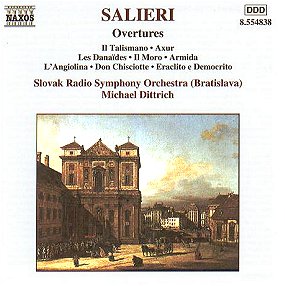Antonio SALIERI (1750 -
1825)
Overtures
Il Talismano 3'12"
Eraclito e Democrito 3'46"
Cesare in Farmacusa 4'43"
Il Ricc0 d'un giorno 3'39"
La Secchia rapita 6'15"
Axur, Re d'Ormus 3'15"
Les Danaïdes 5'42"
Don Chisciotte allnozze di Gamace 6'58"
La Grotta di Trofonio 5'35"
Il Moro 2'47"
Armida 5'51"
L'Angiolina
5'03"
 Slovak Radio Symphony Orchestra
(Bratislava) Michael Dittrich.
Slovak Radio Symphony Orchestra
(Bratislava) Michael Dittrich.
Recorded Concert Hall of Slovak Radio. 22 - 27 April 1991 (Tracks 1 - 7,
9 - 10) 11 - 13 May 1992 (Tracks 8,11,12)
DDD
 Naxos 8.554838
[57'46"]
Naxos 8.554838
[57'46"]
Crotchet
Amazon
UK
Amazon
USA

There used to be an eminent cartoonist who specialised in using the caption
"The Man who........." as the usual title for his drawings - amusing little
trifles normally alluding to slight moments of minor social embarrassment
that didn't matter a jot in the real world. The composer Antonio Salieri
has, erroneously and unfairly, gone down into popular culture as "The Man
who poisoned Mozart" based on a 'confession' on his deathbed when clearly
he was rambling. Subsequently Pushkin, in a short story, and Rimsky-Korsakov
in his opera Mozart & Salieri used the idea and helped it to spread
but with the popular success of Peter Shaffer's Amadeus fiction becomes
fact. In the eyes of the film-going public Salieri for evermore is the composer
who did not have the skills and talents of a younger rival whom he resented
and eventually disposed of. Nowadays, of course, his beneficiaries and
descendants would be suing for millions.
There may well have been some resentment on Salieri's part - a normal human
reaction. After all he was the Court Composer and later Kapellmeister in
Vienna and had had considerable success in Paris and elsewhere with a number
of considerable successes to his name. Salieri as a musician would have been
well aware that he lacked the touch of genius that was Mozart's that he would
never have and simply had to live with the fact.
The twelve overtures on this recording give a good indication of Salieri's
skills. Clearly he was more than a mere journeyman dashing off a few pages
to raise a few bob when a bill came in. Overtures - then as now - had a dual
function - to let the audience know it was time to settle down and to give
them a taster of what was to come.
Catching the attention was the easy part - a few loud chords, as in the first
selection " Il Talismano" and the drum roll to open "Cesare in
Farmacusa" would settle the listeners. The other scene-setting element
is amply illustrated in the gentle flute passage in "Eraclito e Democrito"
and the mock gravity in the episodic "La Secchia rapita" - a tale
of a war between states over a stolen bucket, no less. There is a pleasant
closing melodic passage in "Armida" and the "Don
Quixotte" overture has some double quick violin playing and an attractive
minuet interlude.
There is something in each of the dozen examples which catches the attention.
Thoroughly competent, thoughtful pieces with touches of pleasing melodies
and lots of dynamic contrasts written in. They show the composer in a good
light, helped by a decent recording and playing. Not to be played through
one after the other but as a reminder of a man unfairly treated by posterity
they serve their purpose.
Reviewer
Harry Downey

